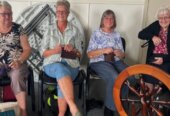
On the watch: from left, Garry Dyet, Tim Gunn, Damian Wiseman and Hamish Crocket.
Waipā District Council chief executive Garry Dyet and three other high-profile type one diabetics are calling on Pharmac to increase its funding for them and the country’s 28,000 other sufferers.
They say the investment would reduce health system costs.
The four are part of Nightscout New Zealand, a non-profit advocacy group promoting access to and use of modern technologies for managing type one diabetes.
Type one diabetes is a lifelong auto immune condition where people must maintain a round-the-clock eye on their sugar levels.
About a tenth of the 278,000 people diagnosed with diabetes in New Zealand – type two is a blood glucose disorder usually associated with lifestyle choices – have the type one variant which has no cure.
Insulin – the sugar-regulating hormone produced by the pancreas – is needed by type one diabetics to survive. Just how much insulin they need is a decision they make many times a day.
Dyet, Waikato University social scientist Hamish Crocket, MetOcean scientific systems engineer Tim Gunn and Paralympics New Zealand Waikato cycling hub coach Damian Wiseman say because of the watches they wear and the cellphone app they use, they do not have to do up to eight finger-prick tests each day to assess their blood sugar levels – or make more than 250 life-saving decisions.
The data is there on their wrists and in their phones. They pay a monthly fee of just under $400 for it and no longer need to constantly interact with primary and secondary care health professionals to access their own status.
A tiny and discreet transmitter on their bodies sends blood glucose data to their watches and phones every few minutes, making it easier for them to make more informed decisions about diabetes management. Data can also be provided to family members – vital when children have type one diabetes – and to their GPs and diabetes healthcare professionals.
- Each day for a type one diabetic is different and a raft of things affect blood glucose levels. For this picture we see that the person using the app requires just 81% of the insulin they normally require, but the programme has kept them in range, shown as the green area on the graph. You’ll see the very flat blood glucose line over-night, which is a primary reason for very good sleep….no going high or low with blood glucose levels.
- A typical response to carbohydrates with the fast acting insulins. You see where this person has dosed for 30 grams of carbohydrate (say two slices of bread) at around midday, and his/her blood glucose levels spike at around 2:00pm. With more carbohydrate these spikes become larger. Ultrafast acting insulins, which aren’t available in NZ reduce these spikes as the insulin works much quicker.
- This is an android watch which has the ability to interact with the app. You can see the blood glucose data, basal insulin rates, plus insulin and carbohydrates on board. You can also see bolus for food, acknowledge alarms and set temporary basal rates directly from the watch…..i.e., you don’t have to get your phone out.
Having the data readily available enables them to regulate their exercise and medication and decide whether that extra bit of food or drink is going to increase their blood glucose levels.
Dyet started on the trial in 2018 “and never slept so well in my life.”
“The biggest change is that at last you get a sense of being in total control of a condition which would normally dominate your life due to the need for dozens of decisions each day.
“The artificial pancreas makes most of those decisions for you with a programmed response to the data it receives every five minutes.
“Life is much better with a functioning pancreas … even if it is an artificial one,” he says.
“Making continuous blood glucose sensors and ultrafast insulins available would open the door for others to take advantage of this life changing technology, reduce complications and hospitalisations, and significantly improve quality of life for patients and care givers.”












